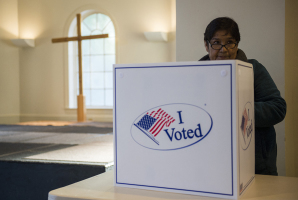Decline of old-line Protestantism is new opportunity for the Gospel

Nearly one-quarter of Americans identify as Evangelical Protestants. Those affirming Catholic faith are roughly another quarter. And about one-third of us say we have “no religion.” These are the findings of recent General Social Survey data presented by Eastern Illinois University political scientist Ryan Burge.
What a great opportunity to share the Gospel of Jesus Christ! So many who need Him, and so many ways to share the good news with them.
The news about the rise of the unaffiliated has overshadowed something buried a bit further down in the survey’s findings: The collapse of “mainline” Protestantism.
Only 11 percent of our fellow citizens now identify as members of the “mainline.” This is a decline from 28 percent in 1972.
What are these churches? The seven “sisters” of American Protestantism include the Evangelical Lutheran Church in America, the United Methodist Church, the Episcopal Church, the Presbyterian Church (USA), the American Baptist Churches, the Disciples of Christ, and the United Church of Christ.
The news for these denominations is getting worse. “Given current trend lines, mainline Protestantism will be closing up shop by 2039. The numbers keep dwindling in both those who attend a ‘mainline’ church regularly and those who identify with a mainline denomination,” reports journalist Bill Brady.
With every respect for those believers who persevere in the old-line Protestant groups in the hope of bearing witness to the living Savior, this decline should come as no surprise. Why bother attending a church where the sum total of the theology can be summarized as:
- Believe in an undemanding, all-succoring deity;
- be nice to people;
- question or deny every tenet of historic Christian theology:
- affirm all manner of sexual behavior for everyone at pretty much any time; and
- support left-wing social and political action.
It’s a lot simpler to stay home, have coffee and watch Oprah. And saves money, too.
As historian Rodney Stark has written, “The wreckage of the former Mainline denominations is strewn upon the shoal of a modernist theology that began to dominate the Mainline seminaries early in the nineteenth century. This theology presumed that advances in human knowledge had made faith outmoded … Eventually, Mainline theologians discarded nearly every doctrinal aspect of traditional Christianity.”
This claim is born out by hard research. In their 2016 paper, “Theology Matters: Comparing the Traits of Growing and Declining Mainline Protestant Church Attendees and Clergy,” researchers David Millard Haskell, Kevin N. Flatt and Stephanie Burgoyne show that most churches that teach the historic Christian gospel are growing – and those that do not, are not.
For example, this study shows that “79% of growing congregants agreed strongly with the statement, ‘Through the life, death and resurrection of Jesus, God provided a way for the forgiveness of my sins,’ whereas only 57% of declining congregants thought the same.”
Put more simply, people need the truth and hope offered in the good news that God became a man in the historic person Jesus of Nazareth. He lived a sinless life, performed matchless miracles, died an atoning death, and rose to new life on the third day. He now offers new and eternal life to all who decide to place their trust in Him for remission of their sins.
For Evangelicals, there is nothing to crow about in the collapse of the once-mainline but now old-line churches. Their abandonment of Christian teaching and the shabby, flabby message with which they have replaced it is a tragedy that both grieves and outrages the heart of God.
But in this, there is opportunity. To reach the disaffected Protestants who have “voted with their feet” and chosen to abandon the denominations of their youth is yet another chance for those who have been born again to bear witness to the Risen One.
Will we take it?




























